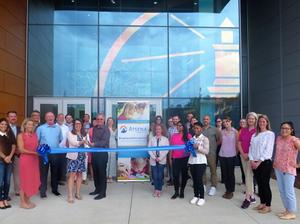
A Raleigh-based health care startup is planning a significant expansion after closing a $4 million raise.
The company, Lumata Health, has developed a technology platform through which it partners with ophthalmology practices to support patient adherence of treatment plans between visits with their providers. After beta testing the platform for about a year with about 50 providers, including some in North Carolina, Lumata is ready to embark on a rapid expansion.
Lumata was founded in late 2017 by ophthalmologist and retina specialist Dr. Stephen Fransen in response to watching patients firsthand go blind from diseases that are treatable if managed properly. The company is led by CEO Landon Grace, who is also an associate professor of mechanical and aerospace engineering at N.C. State.
"How do we close the gap between, we can treat these diseases, but yet, people are going blind?" Grace said. "That's what we set out to solve."
Grace joined Lumata in early 2018 to lead its research and development efforts as the company's chief scientific officer, before transitioning to CEO in June. Prior to moving to Raleigh and joining N.C. State about six years ago, Grace was an assistant professor at the University of Miami, where he was involved in ophthalmology research.
During its beta testing stage, the company's sales have mostly been word-of-mouth, Grace said. But for this next step, the company is bringing on personnel to lead its sales and business development efforts as it grows the number of ophthalmologists it works with in all settings including private practices and academic institutions. The company is investing on the tech side as well, with an aim to make its process more seamless for customers, physicians and patients.
To support these efforts, the virtual company of about 46 full-time employees plans to bring on a lot more employees over the next year. Grace said Lumata could end 2023 with a headcount near 200 employees. And as Lumata grows, the CEO anticipates the company will establish a physical footprint in the Raleigh area over the next two or three years.
The need for this Series A round and the expansion it will fund is supported by the demand the company has seen through its beta testing. Lumata mostly focuses on diseases that are age-related, with most of its patients near 80 years old. The aging population in the U.S. means more demand for eye care services. Additionally, the staff shortages plaguing various areas of health care creates opportunities for Lumata to remove some of the in-office workload from ophthalmology practices.
Lumata assists patients with diseases that can be cumbersome and require daily attention, therefore leading to issues with adherence. Through its platform, which incorporates various types of data, the company engages with patients exactly when needed to help "bend the arc" of their disease progression. This can include arranging transportation, coordinating medication refills and keeping patients on track with their treatment.
"What we do is partner with ophthalmologists and work with them to make sure that the patient is staying on track with the care that the ophthalmologist designed," he said. "It's about removing barriers to care."
Oklahoma-based Cortado Ventures led this Series A round, which included participation from the Wolfpack Investor Network and dozens of ophthalmologists throughout the U.S. The company
Prior to this round, Lumata had received more than $2 million in research funding from the National Eye Institute, which is part of the National Institutions of Health. While Lumata isn't ruling out a potential future fundraising round, Grace said the company sees an achievable path to profitability with this existing funding.

